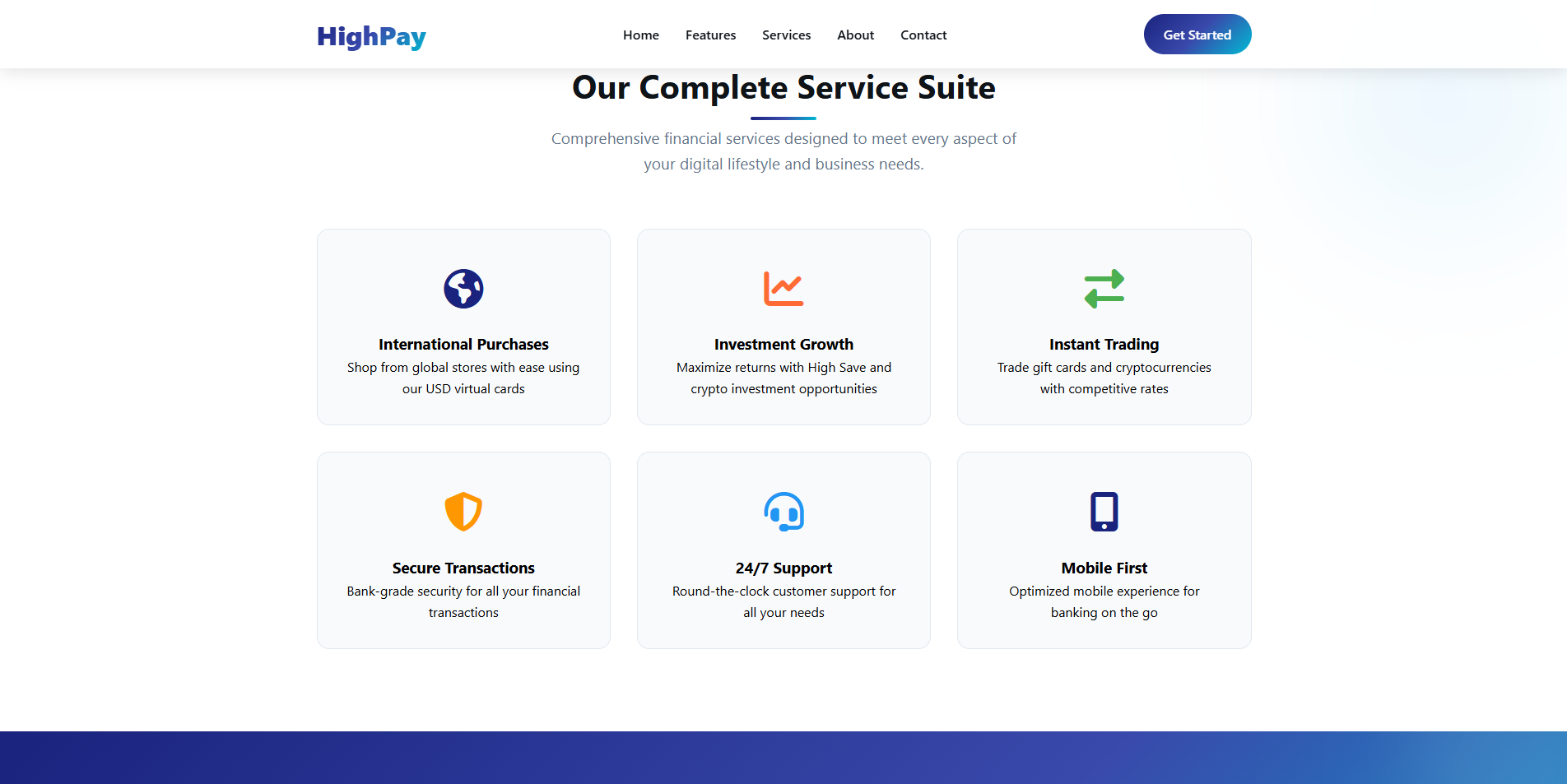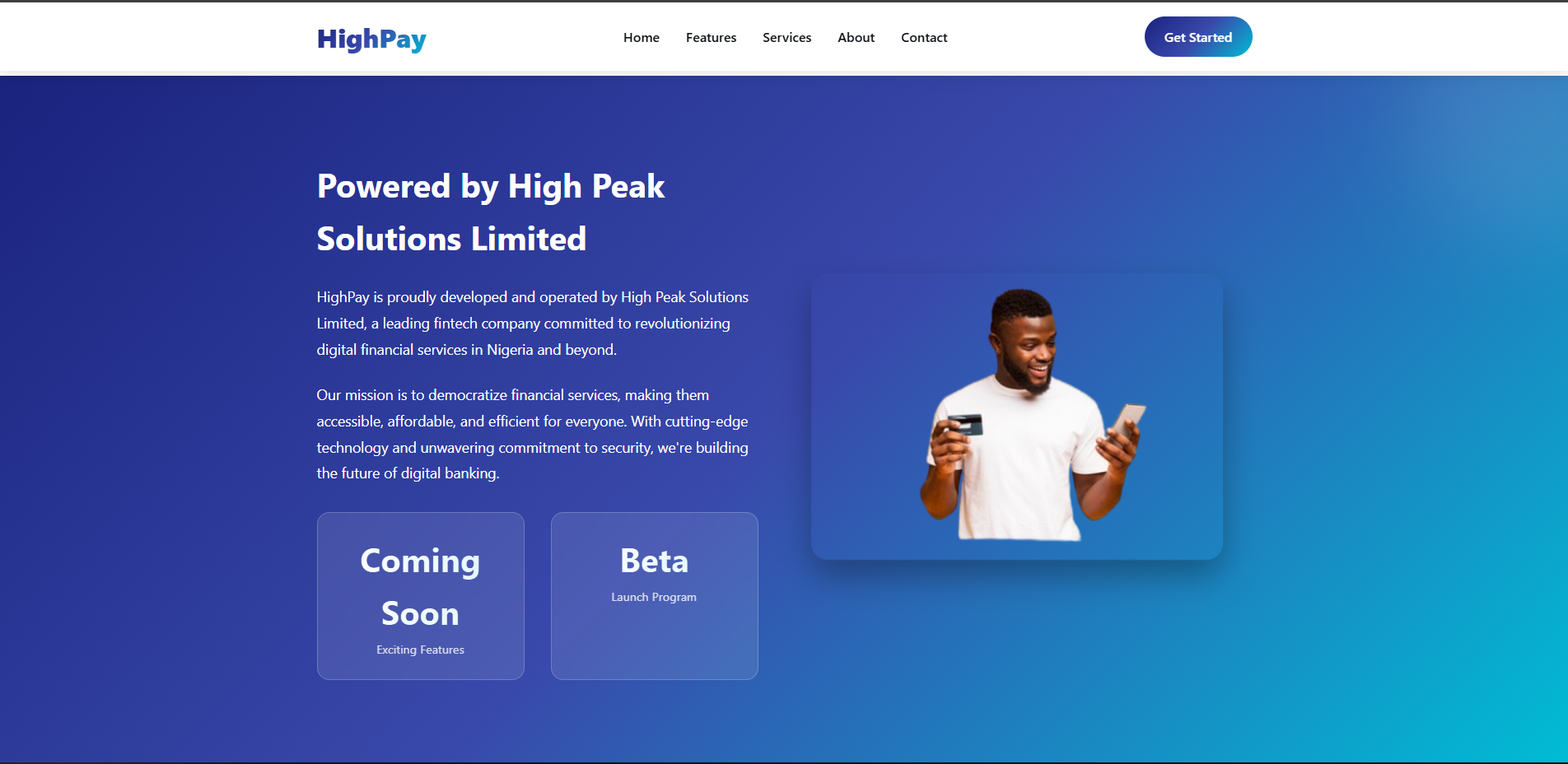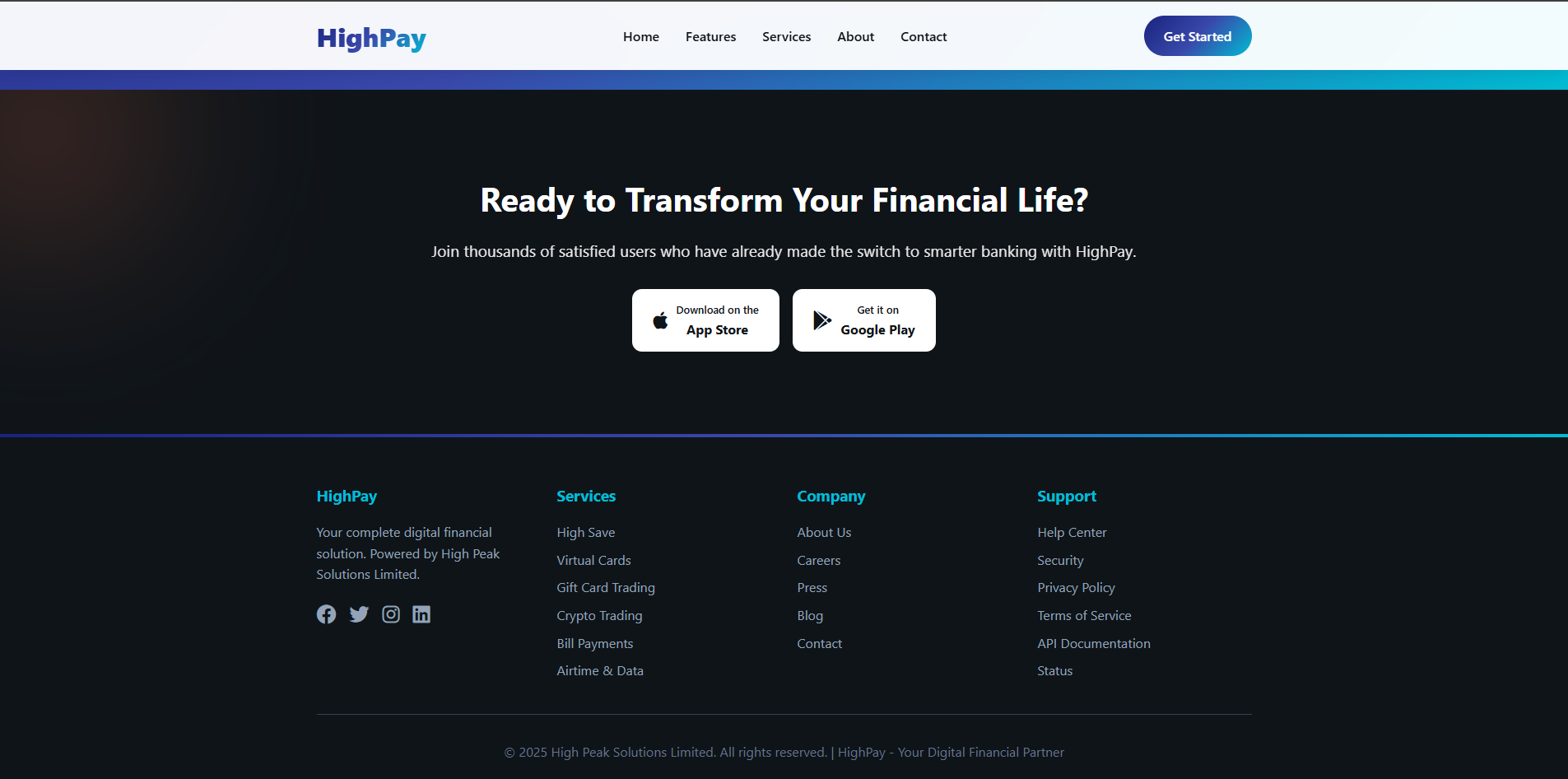
Review on Highpay
Summary
About Highpay
HighPay presents itself as a full-service “digital financial solution” platform for Nigerians. It claims to offer an integrated wallet, savings (High Save), virtual USD and physical cards, gift card trading, crypto trading and wallet storage, bill payments, and global purchasing capability via virtual cards. On the homepage, it promises features like “save smarter,” “trade effortlessly,” “manage all your finances in one app.”
In marketing materials, HighPay positions itself as a fintech “all-in-one” alternative to traditional banks, promising competitive interest rates, seamless international spending, and fast settlement of gift card trades. There is also mention of 24/7 support, “bank-grade security,” and a “mobile first” design.
However, the website provides very little verifiable evidence of its operational history, regulation, track record, or real users. Some external domain-analysis tools estimate that the site is worth only a few dollars and has minimal daily income, which suggests minimal genuine usage.
Because of the high level of promises and the low transparency, there is significant risk in believing HighPay is legitimate. In what follows, I break down key observations, red flags, and my conclusion.
More Details
Mismatch between promises and proof
Real financial startups typically build trust via transparency: audited financials, regulatory disclosures, media coverage, user case studies, etc. HighPay has none of these visible. The very large promised suite of services (from savings to global cards to crypto) demands significant infrastructure, compliance, banking relationships, and capital. That doesn’t align with their traceable footprint (low domain value, minimal traffic). It suggests the promises are unbacked.-
Domain metrics inconsistent with active fintech
The domain’s estimated worth (USD 8.95) and daily income (USD 0.15) are absurdly low for a platform that claims to offer high-volume financial operations. If real users were moving money, the site would have significantly more traffic, backlinks, mentions, and valuation. Such mismatch indicates that there is little or no real usage behind the facade. -
Shared hosting with dubious neighbors
The IP address of the site hosts many other unrelated, low-quality or possibly scammy domains. This is typical of shared cheap hosting often used by fraudsters rather than dedicated infrastructure. This undermines confidence in the platform’s technical legitimacy. -
Lack of verifiable user testimonials or withdrawal evidence
Usually, even dubious fintechs have users who brag (or complain) about withdrawals, transfers, etc. But I found no credible, documented evidence that users have successfully withdrawn from HighPay. The absence of such proof in the open is telling — they either don’t allow withdrawals, or freeze funds when requested. -
Anonymity of operators
Legitimate fintechs are led by known founders, publish addresses, corporate registrations, board members, or investor backing. HighPay shows no such details. That anonymity is commonly used by scam operators to avoid accountability. -
Regulatory risk environment
In Nigeria, the fintech sector is under increasing scrutiny. Fraud cases have escalated. Agencies like the EFCC are actively investigating misuse of identity data in fintech operations. A platform operating without clear licensing or oversight is extremely risky. -
Business model unfeasible or opaque
How do they fund “high interest” or returns? The only plausible mechanism is by using funds from new depositors to pay earlier ones (a Ponzi-like approach). Without real revenue streams or transparency, the entire “investment return” logic is suspect. -
Exit-scam pattern matches
Many scams operate by building trust with small payouts early, attracting more users and money, then at a critical point either freeze withdrawals, disappear, or abandon the domain. HighPay’s pattern fits many elements of that pattern: flashy promises, anonymity, lack of proof, weak infrastructure.
Based on all these factors, I assess that HighPay is very likely a scam or fraudulent scheme. There is insufficient evidence to consider it legitimate or reliable.

Warning: Low score, please avoid this website!
According to our review, this website has a higher risk of being a scam website.
It may attempt to steal your funds under the pretense of helping you make money.
Notice: High Score — Not likely to be a scam website.
According to our review, this website has a low risk of being a scam.
There is minimal indication of fraudulent activity.
Notice: Moderate score — Caution advised.
According to our review, this website shows a moderate risk level based on current data.
There is no strong evidence of a scam, but users should proceed carefully.
Photos of Highpay
Pros
- Ambitious feature set – The platform promises many useful fintech features (saving, crypto, card, bills) in one app, which is appealing if it works.
- Attractive marketing — high-return language, “multiplying wealth” promise, global spending, etc.
- Low barrier for entry — users might be enticed by apparent easy onboarding.
Cons
- No regulatory backing or license visible — huge red flag in fintech.
- Promises too good to be true — such returns and seamlessness are rare.
- Lack of transparency — no audits, no track record, no public disclosures.
- High risk of losing funds — since withdrawal, account safety, or continuity may be nonfunctioning.
Website Overview
Country:
NIGERIA
Operating Since:
2025
Platforms:
Mobile/Desktop
Type:
Fintech
Spread:
N/A
Funding:
Fintech
Leverage:
N/A
Commission:
N/A
Instruments:
N/A
Keypoints
Aggressive & sweeping promises The service claims to cover nearly the entire gamut of fintech offerings (saving, crypto, cards, gift card trading, bill payments) — this breadth is a red flag, because real startups usually scale gradually. Promises of “automated saving plans” and “competitive interest rates” are common bait used by fraudulent platforms.
No verifiable user reports / reviews I found no credible, independent reviews (from known fintech blogs, regulators, user forums) that confirm real people using HighPay successfully or withdrawing funds. No media coverage or press announcements that suggest HighPay is recognized in trusted fintech circles.
Lack of credible regulatory disclosures The website doesn’t clearly display licensing (e.g. by Nigeria’s Central Bank, SEC, or other financial regulators). No clear “Terms of Service,” “Risk Warning,” or “Regulatory Compliance” sections are easily found.
No transparency on team, founders, or backing The site doesn’t clearly present who is behind it, their credentials, or any verifiable business registration information. That anonymity is a common hallmark of shady scheme
Overall Score
Final Thoughts
After viewing and analyzing the site thoroughly by our experts and undergoing the proper process, we have reached a final conclusion.
After analyzing the website, promises, infrastructure, metrics, regulatory environment, and absence of credible user confirmation, my conclusion is that HighPay is extremely risky and likely a scam.
I would strongly advise against depositing any funds or trusting them with user identity or financial assets. If any user already has money in there, they should attempt to withdraw immediately, document everything, and consider reporting to relevant regulators (e.g. Nigeria’s SEC, CBN, EFCC).
In the fintech space, trust is built via transparency, licensing, public accountability, audits, regulatory compliance, and user history. HighPay fails nearly every one of those criteria. Until it can demonstrate verifiable proof (withdrawals, auditor statements, regulatory licenses, credible press, real users), one should regard it as unsafe and speculative at best.







Comments